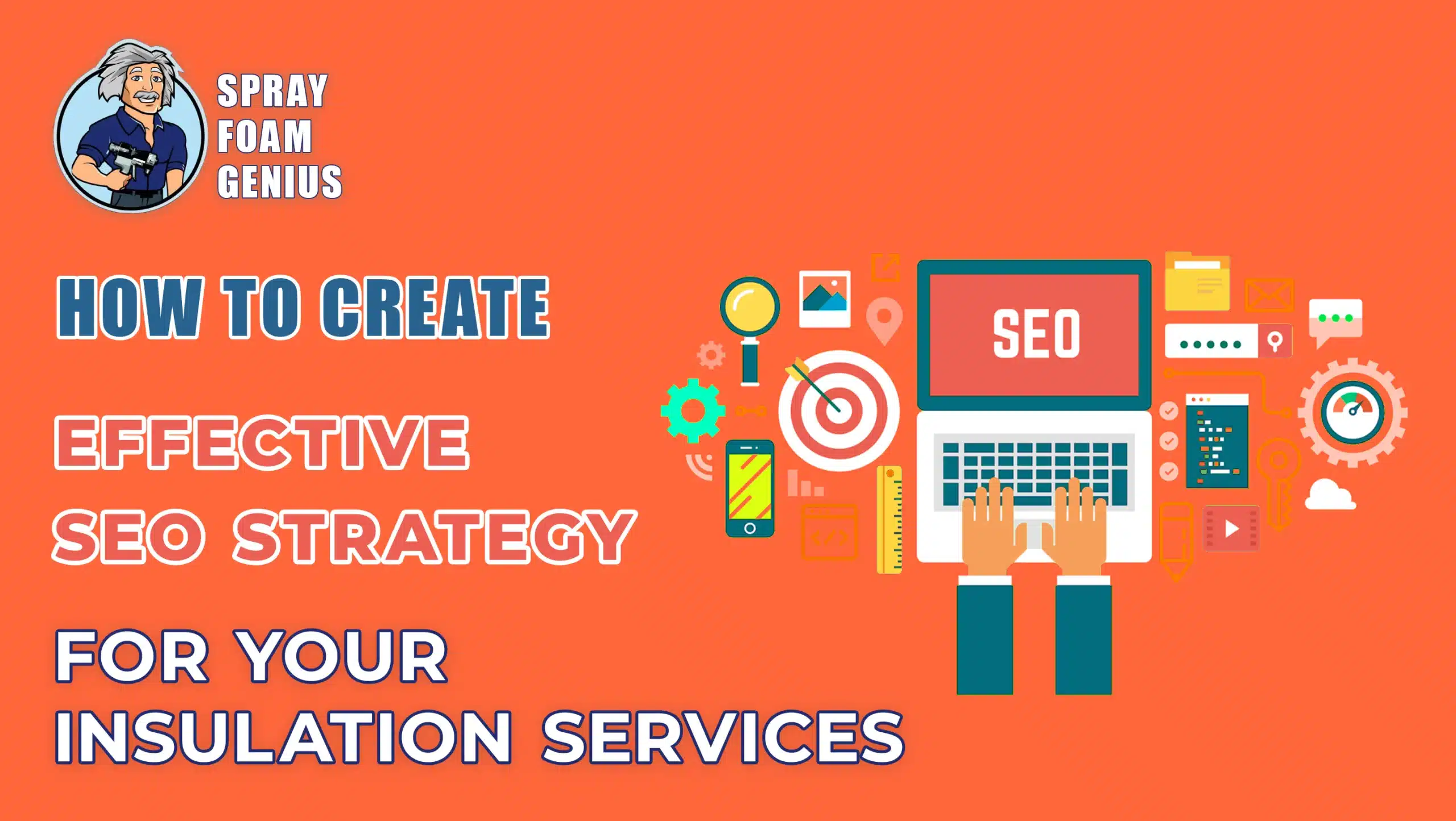
In today’s competitive online landscape, having an effective SEO strategy for your insulation services is no longer optional—it’s essential. Whether you’re a contractor in the USA or Canada, optimizing your online presence can lead to more website visitors, more leads, and ultimately, more clients. As an insulation contractor, investing in SEO allows you to increase your visibility, build trust with potential customers, and stand out in an ever-growing market. This guide will walk you through the key steps to create an SEO strategy that works for your insulation business.
Why SEO is Crucial for Insulation Contractors
SEO (Search Engine Optimization) is the process of optimizing your website and online presence to rank higher in search engine results. When potential clients search for insulation services in their area, they’re likely to click on businesses that appear on the first page of Google. This makes SEO an invaluable tool for ensuring that your business ranks well for relevant keywords, driving organic traffic to your site. If you want to capture local customers in the USA or Canada, an SEO strategy tailored to your specific business needs is key.
Understanding Your Target Audience
Before diving into SEO tactics, it’s essential to understand your target audience. Most customers searching for insulation services are looking for reliable, trusted professionals in their local area. Your SEO strategy should be designed to target these customers specifically by focusing on location-based keywords, user intent, and content that addresses the unique needs of your potential clients.
In addition to location, consider the types of services people typically seek. For instance, are they looking for energy efficiency improvements, mold prevention, or soundproofing solutions? These insights will help you refine your SEO approach and ensure your website attracts the right visitors.
Keyword Research for Insulation Services
Keyword research is the foundation of any successful SEO strategy. It involves identifying the words and phrases that potential customers are searching for when looking for insulation services. For example, instead of just focusing on broad terms like “insulation contractor,” you may want to target more specific keywords such as “home insulation services near me” or “energy-efficient insulation installation.”
Here are some key types of keywords to focus on:
- Primary Keywords: These are the main terms that define your business, such as “insulation contractors,” “energy-efficient insulation,” and “attic insulation.”
- Secondary Keywords: These are related terms that help add depth and context to your content. Examples include “residential insulation,” “basement insulation services,” or “best insulation for homes.”
- Local Keywords: If you’re targeting customers in specific cities or regions, including location-based keywords is crucial. For example, “insulation contractors in Toronto” or “Vancouver attic insulation.”
When performing keyword research, use tools like Google Keyword Planner, SEMrush, or Ahrefs to find the search volume, competition level, and relevance of each keyword. By identifying keywords that align with your services, you can create targeted content that resonates with your audience and ranks higher in search results.
Optimizing Your Website for SEO
Once you’ve identified your target keywords, it’s time to implement them throughout your website. A well-optimized website is essential for search engines to understand what your business is about and rank it accordingly. Below are some best practices to ensure your website is SEO-friendly.
1. Optimize On-Page Elements
Title Tags & Meta Descriptions: Ensure your title tags and meta descriptions include your target keywords and are compelling to click. For example, instead of a generic title like “Home Page,” try something more specific like “Reliable Insulation Services in [City] – Energy-Efficient Solutions.”
Header Tags (H1, H2, H3): Use proper heading tags to structure your content. Your H1 tag should contain the main keyword (e.g., “Insulation Contractors in [City]”), while H2 and H3 tags can be used for subheadings that provide more context (e.g., “Energy-Efficient Insulation Solutions”).
URL Structure: Clean, descriptive URLs help both search engines and users understand your content. For example, a URL like “www.yoursite.com/insulation-services” is more effective than “www.yoursite.com/page123.”
2. Mobile Optimization
More than half of web traffic now comes from mobile devices, so it’s crucial that your website is mobile-friendly. Google also uses mobile-first indexing, meaning it prioritizes the mobile version of your site for rankings. To ensure your website is optimized for mobile:
- Use responsive design, so your website adapts to different screen sizes.
- Ensure fast loading speeds by optimizing images and leveraging browser caching.
- Avoid using pop-ups that could interrupt the user experience.
3. Fast Page Loading Speeds
Page load speed is a ranking factor for SEO, so ensuring your website loads quickly is critical. Use tools like Google PageSpeed Insights to check your website’s speed and identify areas for improvement, such as compressing large images, minifying code, and using a content delivery network (CDN).
Local SEO for Insulation Contractors

Since insulation services are typically local, local SEO plays a major role in your SEO strategy. Local SEO is all about making sure your business shows up in local search results, such as when customers search for “insulation services near me” or “insulation contractors in [City].”
1. Optimize Google Business Profile (GBP)
Your Google Business Profile (GBP) is one of the most important tools for local SEO. It’s a free listing provided by Google that allows you to showcase your business details, including your address, phone number, hours of operation, and customer reviews.
To optimize your GBP:
- Ensure your business name, address, and phone number (NAP) are consistent across all online platforms.
- Add high-quality images of your work to your GBP profile.
- Encourage satisfied clients to leave reviews on your profile.
- Use relevant keywords in your GBP description and services sections.
2. Local Citations
Local citations are mentions of your business on other websites, such as online directories, review sites, or local chambers of commerce. Consistent citations help boost your authority and improve your local search rankings. Some of the most well-known citation sites include Yelp, Yellow Pages, and Angie’s List.
3. Local Content Creation
Creating localized content can help you rank higher for local searches. Consider writing blog posts or service pages focused on insulation needs in specific areas or regions you serve. For example, you could write an article titled “Why [City] Homeowners Need Attic Insulation” or “Energy-Efficient Insulation Solutions for Homes in [Region].”
Content Marketing: Build Trust and Authority
To further boost your SEO, implement a content marketing strategy that provides value to your audience. Creating informative blog posts, videos, and case studies not only helps you rank for more keywords but also positions your business as an authority in the industry.
When crafting content, consider the following:
- Educate your audience: Provide valuable information about insulation options, energy savings, and how your services benefit homeowners.
- Answer common questions: Use a Q&A format to address frequently asked questions, such as “What’s the best insulation for homes in cold climates?”
- Showcase case studies: Share success stories from past clients, demonstrating how your services helped them save money and improve their home’s comfort.
In addition, implementing a blog with regular posts that target long-tail keywords (specific phrases with lower search volume but higher intent) can help drive additional traffic to your site.
Building Backlinks for SEO Authority
Backlinks—links from other websites to your site—are another important ranking factor. High-quality backlinks act as a vote of confidence for your business, signaling to Google that your website is trustworthy and authoritative.
To build backlinks:
- Reach out to local businesses and offer to guest blog or collaborate on content.
- Submit your business to reputable directories and industry websites.
- Ask satisfied clients to mention your business on their websites or blogs.
Monitoring and Analyzing SEO Performance
Once your SEO strategy is in place, it’s essential to track your performance and make adjustments as needed. Use tools like Google Analytics and Google Search Console to monitor your website’s traffic, keyword rankings, and other key metrics. This allows you to see what’s working and identify areas that need improvement.
Start Boosting Your Insulation Business’s Online Presence Today!
With a solid SEO strategy in place, your insulation services can stand out in a crowded marketplace. By focusing on keyword optimization, local SEO, content creation, and backlink building, you can improve your search engine rankings, attract more qualified leads, and grow your business.
Ready to take your SEO to the next level? Contact Spray Foam Genius Marketing today at 877-840-FOAM (USA), 844-741-FOAM (Canada), or visit sprayfoamgeniusmarketing.com for expert SEO services tailored to your insulation business. You can also reach us at [email protected].
Let’s work together to bring your business the online visibility it deserves!
- 5 Google My Business Hacks to Double Your Leads for Spray Foam Insulation Contractors - January 14, 2025
- Why Spray Foam Contractors Cannot Ignore Reputation Management in 2025 - January 13, 2025
- Local SEO Secrets Every Spray Foam Contractor Must Know to Win in 2025 - January 13, 2025

